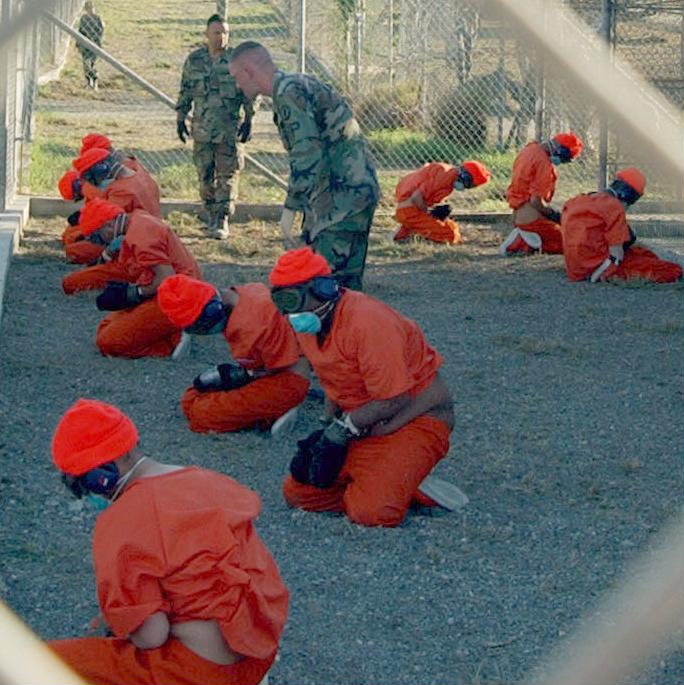Finally, Science Beginning to Prove Torture Doesn’t Work
IN FOCUS, 31 Aug 2015
Russ Wellen – Foreign Policy In Focus
The stress of torture degrades memory and the functioning of the mind.

Successful interrogation requires craft and empathy, not brute force. Pictured: Inmates kneeling on rocks. Guantanamo Bay Detention Camp. (Photo: Shane McCoy / Wikipedia)
19 Aug 2015 – For a long time those opposed to torture, specifically when it’s conducted in recent years by the CIA and U.S. military on terrorism suspects, have maintained that — never mind the extent to which it undermines U.S. claims to moral leadership (though I’m afraid that horse left the barn long ago) — torture doesn’t work. But, until now, there’s been a lack of sufficient research or science to back up those claims.
Now, writes Peter Aldhous at Buzzfeed
Over the past five years, a small group of researchers has pulled together a body of evidence about what works in getting people to give up their secrets. It has nothing to do with abuse and coercion. Instead, it borrows methods from psychotherapy to get suspects talking and uses the science of how our brains process information to separate truth from lies.
“It’s true,” writes Aldhous, “that torture can make people talk. But they will often say anything to make the suffering stop.” Less commonly known…
Recent research … also indicates that brutal treatment will make it difficult, if not impossible, for a detainee to recall the details an interrogator may be looking for. The stress of mock interrogation disrupts trainees’ ability to perform on standard tests of memory, according to studies done by Andy Morgan, a psychiatrist at the University of New Haven in Connecticut and a former intelligence officer with the CIA. Most become detached from reality, showing symptoms of mental “dissociation” — such as time seeming to slow down, or out-of-body experiences — that also happen during traumatic events like car accidents.
In other words — pretty obvious when you think about it — torture degrades the functioning of the mind. Aldhous again:
Expecting brutal interrogations to extract good intelligence is like “banging a hammer on a radio to get a better signal,” [Andy Morgan, a psychiatrist at the University of New Haven in Connecticut and a former intelligence officer with the CIA] told BuzzFeed News. “It doesn’t enhance cognition. It only makes it worse.”
DISCLAIMER: The statements, views and opinions expressed in pieces republished here are solely those of the authors and do not necessarily represent those of TMS. In accordance with title 17 U.S.C. section 107, this material is distributed without profit to those who have expressed a prior interest in receiving the included information for research and educational purposes. TMS has no affiliation whatsoever with the originator of this article nor is TMS endorsed or sponsored by the originator. “GO TO ORIGINAL” links are provided as a convenience to our readers and allow for verification of authenticity. However, as originating pages are often updated by their originating host sites, the versions posted may not match the versions our readers view when clicking the “GO TO ORIGINAL” links. This site contains copyrighted material the use of which has not always been specifically authorized by the copyright owner. We are making such material available in our efforts to advance understanding of environmental, political, human rights, economic, democracy, scientific, and social justice issues, etc. We believe this constitutes a ‘fair use’ of any such copyrighted material as provided for in section 107 of the US Copyright Law. In accordance with Title 17 U.S.C. Section 107, the material on this site is distributed without profit to those who have expressed a prior interest in receiving the included information for research and educational purposes. For more information go to: http://www.law.cornell.edu/uscode/17/107.shtml. If you wish to use copyrighted material from this site for purposes of your own that go beyond ‘fair use’, you must obtain permission from the copyright owner.